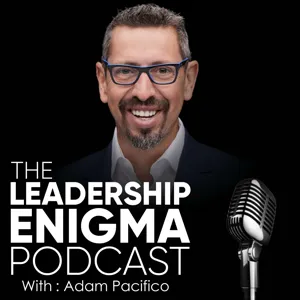186: Tune In | Nuala Walsh

Nuala Walsh is a former senior executive for a FTSE 100 company, behavioural scientist, Ted X speaker, non executive director (including the Football Association and British & Irish Lions) various businesses and charities, author of 'Tune In' and has been recognised as one of the most influential women in finance.
Nuala has interviewed Presidents, top sports stars and executives so this episode focuses on her learning and experience as a senior leader with an insatiable curiosity to understand why people do what they do.
In a noisy world, when we are rewarded by speed, the crisis is growing as regards a leaders inability to ensure that they are making safe, sound and ethical decisions that truly consider the wider implications.
Nuala's Ted X talk was at the University of Salford and focused on 'How to overcome Indecision.' The key message is that indecision is temporary, hidden and is normally a state of mind. No leader admits they are indecisive. Leaders's can control it by understanding one of three barriers that may exist (1) the decision is too big (2) it's too far in the future and a decision doesn't need to be made (3) or its too hard a decision. The solution is to chunk or split the decision into smaller and easier components whilst visualising the end result.
'Tune In' is all about how to make smarter decisions in a noisy world. Nuala describes that the world is very visual and fast paced with too much data coming at leaders from all directions but inside a leader's head is just as crowded and noisy as the external world.
Nuala also describes 'Power Recognition' as one of 10 misjudgement traps. She explains that there are three categories which include 'power seekers', 'power holders' or those who have 'lost or are afraid of losing power.' and she provides some interesting examples which highlights that many leaders have an obsession with identify, title and status.
Leaders must consider their own deaf spots - ask yourself are you a tuned out or tuned in leader? If you are not tuned in you are missing signals that matter.
Nuala has interviewed Presidents, the first man on the moon, top sports stars and executives and she has always been curious as to the human being element of their accomplishments. In this episode she shares some insights from her interview with former President Bill Clinton and top golfer José María Olazábal.
Don't miss this episode.
www.nualagwalsh.com
Tune In is available on Amazon
Watch & Subscribe: 👀 https://www.youtube.com/@theleadersenigma/videos
Listen & Subscribe: 🎙️ https://open.spotify.com/show/5NSnRyHzPmyY5OWhGzKU5P
www.leadersenigma.com